In the ever-evolving world of architecture, one of the most captivating and transformative trends of recent years has been the integration of Smart Homes with AI. This groundbreaking design trend represents a marriage of cutting-edge technology and innovative architectural concepts, offering a glimpse into the future of modern living spaces. With the convergence of artificial intelligence and architectural design, homes are not just spaces but dynamic, intelligent environments that adapt, enhance, and simplify our lives in many ways. Join us on this journey to discover how the fusion of architecture and AI is transforming the very essence of our homes. What is a Smart Home with AI? According to Stanford University, Artificial Intelligence (AI), a term coined by the emeritus Stanford Professor John McCarthy in 1955, was initially defined as “the science and engineering of creating intelligent machines.” Early AI research primarily focused on programming machines to perform tasks cleverly, such as playing chess. However, contemporary AI places a significant emphasis on the development of machines capable of learning, in a manner that somewhat resembles human learning processes. In contrast, a smart home with AI is a home equipped with a range of devices and systems that are interconnected and capable of learning and adapting to your preferences. These devices use AI algorithms to make your daily life more convenient, energy-efficient, and secure. Several existing AI applications are used in our day-to-day lives, significantly enhancing our daily routines. Let’s explore a few examples of AI-powered devices and systems commonly found in smart homes, some of which you may already have in your own home.
1. Smart Assistant
Have you heard of Alexa? According to Amazon, at least one Alexa device is found in 25% of U.S. households. Amazon’s Alexa is one of the most popular smart assistants, harnessing the power of artificial intelligence to interpret your spoken commands and seamlessly manage a wide range of smart devices throughout your home. It serves as the central hub for controlling everything from your lights and thermostats to your music and entertainment systems, making it effortless for you to interact with your smart home. Smart assistants play a vital role in managing our modern homes, making daily tasks more efficient and convenient.
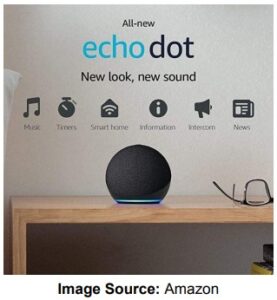
2. Smart Thermostats
Nest’s smart thermostats, powered by artificial intelligence, go beyond traditional thermostats by learning and adapting to your heating and cooling preferences. They create a personalized schedule based on your routines, ensuring your home is at the ideal temperature. These devices optimize energy usage, saving costs and reducing environmental impact, making them a win-win for comfort and the environment.
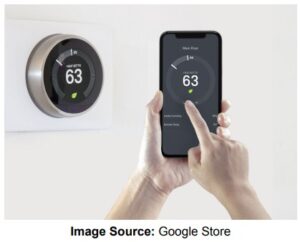
3. Smart Lighting
AI-controlled lighting systems are a game-changer for modern smart homes. Switching to smart LED lighting can save up to 40% of lighting energy, improving efficiency and reducing costs. These systems offer remote control and adapt to your routines, adjusting brightness and color temperature automatically. For example, they mimic sunrise in the morning and
switch to cooler tones during the day, enhancing comfort and saving energy. See the illustration below for how smart lighting works.
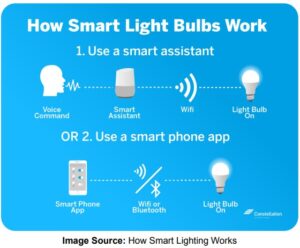
4. Home Security
Investing in security is significant for families, and AI has revolutionized home security. According to Vivint Survey (2023), over 1 in 10 homeowners will upgrade their home security in 2023 by integrating AI features. AI-powered cameras in smart homes now detect suspicious activity and send instant alerts to your smartphone. Doorbell cameras, such as Ring, use facial recognition to identify known and unknown faces, providing peace of mind while enabling remote monitoring and communication with visitors. See illustration below about the perceptions of AI in Home Security Systems based on surveys.
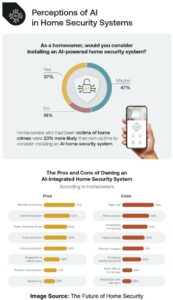
5. Appliances
Smart appliances are the latest trend, incorporating AI into kitchen and laundry devices to enhance interactions. Smart fridges, ovens, and washing machines can be controlled remotely via your smartphone. What’s even more impressive is their capacity to recommend recipes and optimize cycles based on ingredients or fabrics. For instance, a smart fridge suggests recipes from its contents, while a smart oven sets the perfect cooking parameters automatically. These appliances save time and boost household chore convenience and efficiency. See illustration below by one of the top smart refrigerators in the market by Samsung.
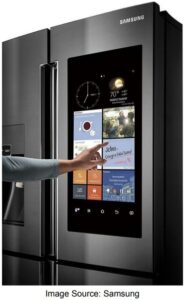
Making Life Easier with AI Technology has made our lives easier, and the integration of AI in architectural homes
enhances quality of life, fosters innovation, improves energy efficiency, saves costs, and enhances safety for families. This marriage of architecture and artificial intelligence redefines homes, making them more convenient and comfortable. It can also assist individuals with special needs, such as the elderly and children. AI surveillance ensures family members’ safety and security.
Some of the benefits of utilizing AI at home is its ability to mimic natural daylight patterns, regulate circadian rhythms, and improve sleep and mood among occupants. Moreover, smart thermostats improve indoor temperatures, reducing stress and enhancing sleep quality, promoting better health. It can also automate temperature and lighting adjustments, reducing cognitive load, minimizing stress, and promoting relaxation.
Architecture has traditionally improved the built environment and people’s lives, but AI can escalate these benefits. Incorporating AI into architectural practices significantly reduces environmental impact and encourages eco-friendly building design and operation. AI develops building systems, leading to lower energy consumption and reduced greenhouse
gas emissions. By using AI smartly, energy consumption can be significantly reduced, contributing to a more sustainable future, lower carbon footprint, and cost savings on energy bills.
In conclusion, AI-powered smart homes are a reality that can transform our lives, offering convenience, energy efficiency, safety, and entertainment. As AI advances, the possibilities for smart homes are limitless. But always remember to do your research before investing in smart home devices to ensure your compatibility and security to the system because through
right choices, you can enhance the power of AI in your home.